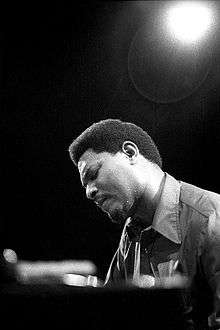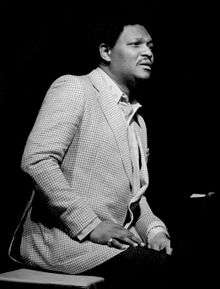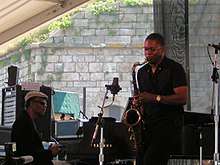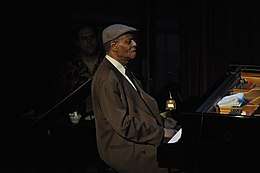McCoy Tyner
Alfred McCoy Tyner (December 11, 1938 – March 6, 2020) was an American jazz pianist known for his work with the John Coltrane Quartet and a long solo career.[1] He was an NEA Jazz Master and a five-time Grammy winner. Not a player of electric keyboards and synthesizers, he was committed to acoustic instrumentation. Tyner, who was widely imitated, was one of the most recognizable and most influential pianists in jazz history.[2]
McCoy Tyner | |
|---|---|
 McCoy Tyner in 1973 | |
| Background information | |
| Birth name | Alfred McCoy Tyner |
| Born | December 11, 1938 Philadelphia, Pennsylvania, U.S. |
| Died | March 6, 2020 (aged 81) New Jersey, U.S. |
| Genres | Jazz, avant-garde jazz |
| Occupation(s) | Musician, composer, bandleader |
| Instruments | Piano |
| Years active | 1960–2020 |
| Labels | Impulse!, Blue Note, Milestone, Telarc, McCoy Tyner Music |
| Associated acts | John Coltrane, Joe Henderson, Freddie Hubbard, Wayne Shorter, Hank Mobley, Stanley Turrentine |
| Website | mccoytyner |
Early life and family
Tyner was born in Philadelphia, as the oldest of three children of Jarvis and Beatrice (Stevenson) Tyner.[3] He was encouraged to study piano by his mother. He began studying the piano at age 13 and within two years music had become the focal point in his life. He studied at West Philadelphia Music School and later at the Granoff School of Music.[4] During his teens he led his own group, the Houserockers.[5]
When he was 17, he converted to Islam through the Ahmadiyya Muslim Community and changed his name to Sulieman Saud.[6] Tyner played professionally in Philadelphia becoming part of its modern jazz scene.[3] His neighbors in the city included musicians Richie Powell and Bud Powell.[7]
Career
In 1960, Tyner joined The Jazztet led by Benny Golson and Art Farmer. Six months later, he joined the quartet of John Coltrane that included Elvin Jones and Steve Davis (later replaced by Art Davis, Reggie Workman, and, finally, Jimmy Garrison).[7][8] He worked with the band during its extended run at the Jazz Gallery, replacing Steve Kuhn. Coltrane had known Tyner for a while growing up in Philadelphia.[9] He recorded the pianist's composition "The Believer" on January 10, 1958; it became the title track of Prestige's 1964 album The Believer issued as a John Coltrane record.[10][11] He played on Coltrane's My Favorite Things (1961) for Atlantic.[12] The band toured almost non-stop between 1961 and 1965, recording the albums Coltrane "Live" at the Village Vanguard (1962), Ballads (1963), Live at Birdland (1964), Crescent (1964), A Love Supreme (1964), and The John Coltrane Quartet Plays (1965), all for Impulse!.[13]
While in Coltrane's group, he recorded albums in a piano trio. In late 1962 and the first half of 1963, Tyner was asked by producer Bob Thiele to record more straightforward jazz albums as a leader. These albums included Reaching Fourth (1963), Today and Tomorrow (1964), and McCoy Tyner Plays Ellington (1965). Reviewing the album in 2017, Marc Myers of JazzWax said, "...the finest of these straightforward piano recordings was Nights of Ballads & Blues. Tyner's playing is exciting and exceptional on all of the tracks... On the album, he exhibits a reserved elegance and tenderness that reveals the other side of his personality—a lover of melody and standards. In this regard, there are traces of Oscar Peterson in his playing. Perhaps Thiele was using Tyner to take a bite out of Peterson's vast and successful early-'60s share of the jazz market."[14] He also appeared as a sideman on many Blue Note albums of the 1960s, although he was often credited as "etc." on the cover of these albums to respect his contract with Impulse!.[7]
Tyner's playing style developed in close contact with Coltrane.[15] His style of piano is comparable to Coltrane's maximalist style on saxophone.[7] Writing in 2019, Sami Linna at the University of the Arts Helsinki, noted that Coltrane described the two different directions in his playing as: "playing chordally (vertically) or melodically (horizontally)". Linna suggests: "Tyner would eventually find a way of dealing with the two directions simultaneously, in a manner that was supportive and complementary yet original and slightly different from Coltrane's approach." After 1960 Coltrane did not hire anyone at the piano if Tyner was not available; between Tyner joining the group (around the end of May 1960) and leaving (in December 1965), there was nobody else at the piano accompanying Coltrane.[15]
Post-Coltrane

Tyner's involvement with Coltrane came to an end in 1965. Coltrane's music was becoming much more atonal and free; he had also augmented his quartet with percussion players who threatened to drown out both Tyner and Jones: "I didn't see myself making any contribution to that music... All I could hear was a lot of noise. I didn't have any feeling for the music, and when I don't have feelings, I don't play".[16] In 1966, Tyner rehearsed with a new trio and embarked on a career as a bandleader.[17]
After leaving Coltrane's group, Tyner produced a series of post-bop albums released by Blue Note from 1967 to 1970. These included The Real McCoy (1967), Tender Moments (1967), Time for Tyner (1968), Expansions (1968) and Extensions (1970). He signed with Milestone and recorded such albums as Sahara and Echoes of a Friend (1972), Enlightenment (1973), and Fly with the Wind (1976), which included flautist Hubert Laws, drummer Billy Cobham, and a string orchestra.[18]
His music for Blue Note and Milestone often took the music of the Coltrane quartet as a starting point. Tyner also incorporated African and East Asian elements in his music. On Sahara he played koto in addition to piano, flute, and percussion. These albums have been cited as examples of innovative jazz from the 1970s that was neither fusion nor free jazz.[19] On Trident (1975) Tyner played the harpsichord and celeste, instruments heard rarely in jazz.[20]

During the 1980s and 1990s, Tyner worked in a trio that included Avery Sharpe on bass[21] and Louis Hayes,[22] then Aaron Scott, on drums.[23] He made solo albums for Blue Note, starting with Revelations (1988)[24] and culminating in Soliloquy (1991).[25] After signing with Telarc, he recorded with several trios that included Charnett Moffett on bass and Al Foster on drums. In 2008, he toured with a quartet of Gary Bartz, Gerald L. Cannon, and Eric Gravatt.[5]
On June 25, 2019, The New York Times Magazine listed McCoy Tyner among hundreds of artists whose material was reportedly destroyed in the 2008 Universal fire.[26]
Tyner is considered to be one of the most influential jazz pianists of the late 20th century, an honor he earned during and after his time with Coltrane.[27]

Tyner, who was left-handed, played with a low bass left hand in which he raised his arm high above the keyboard for an emphatic attack. His right-hand soloing was detached and staccato. His melodic vocabulary was rich, ranging from raw blues to complexly superimposed pentatonic scales; his approach to chord voicing (most characteristically by fourths) influenced contemporary jazz pianists, such as Chick Corea.[28]
Awards and honors
Tyner was named a 2002 NEA Jazz Master by the National Endowment for the Arts.[4] He won five Grammy Awards, for The Turning Point and Journey and best instrumental jazz album for Illuminations, Infinity, and Blues for Coltrane: A Tribute to John Coltrane.[29]
Tyner was awarded an Honorary Doctorate of Music from Berklee College of Music at the Sala dei Notari during the Umbria Jazz Festival.[30] Tyner was a judge for the 6th, 10th[31] and 11th annual Independent Music Awards (IMAs).[32]
Death
On March 6, 2020, Tyner died at his home in northern New Jersey, at the age of 81.[2] His family released a statement on Twitter.[33]
He is survived by his ex-wife, Aisha Tyner, their son Nurudeen, known as Deen, his brother and sister, Jarvis Tyner and Gwendolyn-Yvette Tyner, and three grandchildren.[2] His younger brother Jarvis is the former executive vice-chairman of the Communist Party USA.[34]
Discography
References
- "McCoy Tyner Biography". Mccoytyner.com. September 11, 2007. Archived from the original on May 9, 2008. Retrieved June 25, 2012.
- Ratliff, Ben (March 6, 2020). "McCoy Tyner, Jazz Piano Powerhouse, Is Dead at 81". The New York Times. Retrieved March 6, 2020.
- Chinen, Nate (March 6, 2020). "McCoy Tyner, Groundbreaking Pianist Of 20th Century Jazz, Dies At 81". NPR. Retrieved March 7, 2020.
- "McCoy Tyner". National Endowment for the Arts. 2002. Retrieved March 7, 2020.
- Heckman, Don (March 6, 2020). "McCoy Tyner, jazz piano legend who played with Coltrane, dead at 81". The Los Angeles Times. Retrieved March 7, 2020.
- Turner, Richard Brent (2003). Islam in the African American Experience. Indiana University Press. p. 140. ISBN 978-0-253-21630-4. Retrieved June 25, 2012.
- Yanow, Scott. "McCoy Tyner". AllMusic. Retrieved September 22, 2018.
- "John Coltrane Quartet | Biography & History". AllMusic. Retrieved August 5, 2020.
- "- The Washington Post". Washington Post.
- Nisenson, Eric (August 5, 2009). Ascension: John Coltrane And His Quest. Hachette Books. p. 87. ISBN 978-0-7867-5095-5.
- Porter, Lewis; DeVito, Chris; Wild, David; Fujioka, Yasuhiro; Schmaler, Wolf (April 26, 2013). The John Coltrane Reference. Routledge. pp. 502–503. ISBN 978-1-135-11257-8.
- Burbank, Jeff (April 26, 2016). "Jazz Album Review: My Favorite Things". The Mob Museum. Archived from the original on June 26, 2017. Retrieved March 7, 2020.
- Larkin, Colin (May 27, 2011). The Encyclopedia of Popular Music. Omnibus Press. p. 271. ISBN 978-0-85712-595-8.
- "McCoy Tyner: Ballads & Blues - JazzWax". www.jazzwax.com. July 18, 2017. Retrieved March 8, 2020.
- Linna, Sami. McCoy Tyner, Modal Jazz, and the Dominant Chord (PDF). Sibelius Academy at University of the Arts Helsinki. p. 33. ISBN 978-952-329-140-9.
- Lewis Porter, John Coltrane: His Life and Music, p. 266.
- Lewis Porter, John Coltrane: His Life and Music, p. 268.
- "Fly with the Wind – McCoy Tyner | Credits". AllMusic.
- "MCCOY TYNER Sahara review by siLLy puPPy". JazzMusicArchives.com.
- Yanow, Scott. Trident at AllMusic. Retrieved September 4, 2011.
- "Avery G. Sharpe | Music". music.williams.edu.
- Wilson, John S. (January 13, 1986). "Jazz: Mccoy Tyner's Trio Performs". The New York Times.
- "McCoy Tyner trio's Concert & Tour History | Concert Archives". www.concertarchives.org.
- "Revelations – McCoy Tyner | Songs, Reviews, Credits". AllMusic.
- Cook, Richard; Morton, Brian (2008). The Penguin Guide to Jazz Recordings (9th ed.). Penguin. p. 1427. ISBN 978-0-14-103401-0.
- Rosen, Jody (June 25, 2019). "Here Are Hundreds More Artists Whose Tapes Were Destroyed in the UMG Fire". The New York Times. Retrieved June 28, 2019.
- McNally, Owen (August 3, 1999). "McCoy Tyner: A Long Way From Mom's Beauty Parlor". Los Angeles Times. Retrieved March 7, 2020.
- "McCoy Tyner's Revolution". December 10, 2018.
- "GRAMMY Awards Winners & Nominees for Best Instrumental Jazz Album". Recording Academy. Retrieved March 7, 2020.
- "Hank Jones, Mccoy Tyner, Enrico Rava Honored by Berklee College of Music at Umbria Jazz", Jazz News, 2005.
- "Independent Music Awards – 6th Annual Judges". IndependentMusicAwards.com. October 5, 2009. Archived from the original on October 5, 2009. Retrieved June 25, 2012.
- "11th Annual IMA Judges. Independent Music Awards. Retrieved September 4, 2013.
- Tyner, McCoy (March 6, 2020). "A statement from the Tyner family:". @RealMcCoyTyner. Retrieved March 12, 2020.
- Ratliff, Ben (August 29, 2010). "McCoy Tyner Honors Charlie Parker at Marcus Garvey Park". The New York Times. Retrieved September 22, 2018.
External links
| Wikimedia Commons has media related to McCoy Tyner. |
- Official website

- NEA Jazz Masters biography at International Association for Jazz Education
- McCoy Tyner's musical style at jazz-piano.org
- McCoy Tyner at Jazz Resource Center at jazzcenter.org
- McCoy Tyner Trio with Gary Bartz: concert review, 2011 at allaboutjazz.com
- In-depth interview, 2000 at innerviews.org
- McCoy Tyner discography at Discogs